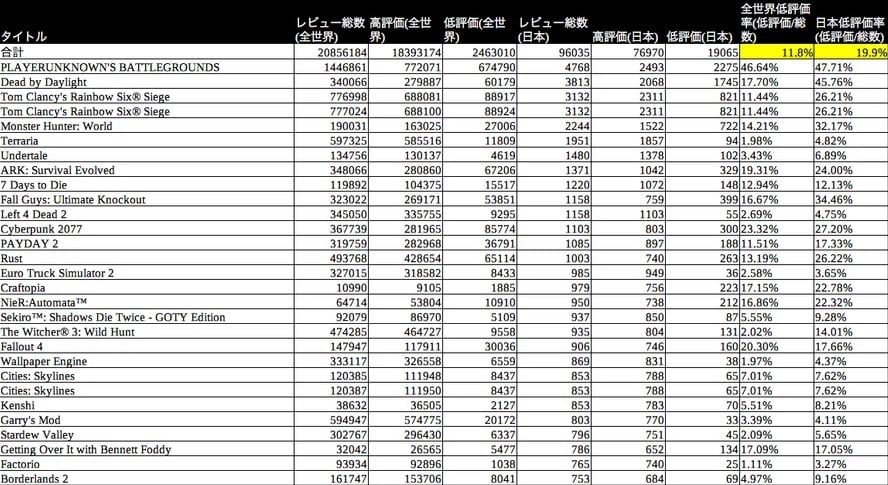Now that the option to display language-specific review scores has finally been added to Steam, publishers will have greater insight into how their games are performing in different regions, and possibly which regions to prioritize when it comes to which languages to localize for. In the wake of the update, Shinjisan, a Japanese streamer, made a post on X talking about the “negative review habit” of Japanese people and how it could impact publishers in the future.
“Whichever game I checked, the majority of Japanese reviews were negative,” Shinjisan said in his post. “However, if you actually read what the negative reviews are saying, you’ll see that many of them are surprisingly reasonable.” While acknowledging that there’s nothing wrong with leaving bad reviews, the streamer suggested that many Japanese people only write reviews when they want to complain about a certain aspect of a game, but don’t go out of their way to leave positive reviews on the games they liked. This means that Japanese-specific review scores on Steam will potentially be heavily skewed, representing only people who disliked a title.
“Steam reviews can largely affect how a game sells, and apparently, some developers have started avoiding releasing Japanese language support for games during Early Access or on day-one in order to avoid accumulating bad reviews right off the bat,” Shinjisan suggested (more on whether this is true later in the article). Many other Japanese X users seemed to sympathize with the sentiment and acknowledged the problem. While constructive criticism is important, posting positive reviews can boost the motivation of developers to work harder on the game, another user suggested. The general consensus among Japanese netizens does seem to be that they tend to leave more negative reviews, especially due to cultural factors (a 3 stars rating may be considered “averagely good,” but it does not hold the same connotation in the West), but what do the statistics say about this?
According to user-conducted online research from 2021 and a corresponding data analysis from 2022, there is a tendency for Japanese Steam users to leave significantly more negative reviews compared to users overseas. The research compiled data collected from 262 game titles that had over 100 cumulative reviews from Japanese users. The results suggest that 19.9% of overall negative reviews on Steam account for those made by Japanese users, which is a significantly higher ratio compared to the worldwide average of 11.8%. Another interesting piece of data that showed a much more drastic difference in negative reviews was regarding Dead by Daylight, a game that had the second highest number of worldwide reviews at the time. According to the data, there was around 17% of negative reviews worldwide, while around 45% of them were made by Japanese gamers. But does that actually impact the decision of overseas publishers to localize their games for the Japanese market?

Unfortunately, the aforementioned research does not contain enough data that would prove one or the other, and some users even argue that the theory is unfounded. While it wasn’t research based on hard data, a while ago AUTOMATON scratched the surface of the matter by interviewing 8 different Steam publishers. Responses indicated that some of them were indeed met with more negative reviews from Japanese gamers than others, but most of the publishers did not show any intentions of withholding Japanese language support from their games.
On the other hand, it seems like many Japanese Steam users are anxious about the “problem” of not leaving positive reviews, not only because of the possibility of overseas publishers backing out, but because it may negatively impact domestic developers as well. This is especially true for Japanese indie developers who rely on positive word-of-mouth to boost the visibility of their games. Taking notice of this problem in recent months, many indie devs have been encouraging players to leave short reviews – even if it’s just a single word.






I’m confused, where in the world is 3/5 stars /not/ considered average-good? 2.5 is the mid way point after all…
3 is in fact the exact middle for a 1-5 review system. 2.5 is the middle for a 0-5 system, but those are much rarer.
I generally prefer 0-10 or percentage based systems, feels like those are clearer.
@sarah Generally, Steam users can’t see how many stars a review gives. You can only see Positive or Negative.
Also 3/5 might sound good in general, but when you look at gaming history, those 60% scores are reserved for disappointments and truly mediocre games. Games people rarely call good. You said 2.5 is the midway point – look no further than the infamous Sonic 06. Yeah, some kids who grew up with it might say it wasn’t so bad today, but back then it was called the worst game ever, and destroyed the series reputation. Whether the series had more games with 3/5 stars or not didn’t matter. To the people, Sonic didn’t have a good game since the 90s. No, thus wasn’t a case of Sonic fans being Sonic fans. This was a AAA game franchise getting their status revoked and shunned from mainstream.
What is annoying is that this is absolutely cultural. No one gives 5/5 stars in Japan. 3 is considered exceptional. 2 is good. 1 is not good.
The reasoning is straightforward. “Good for me” is not at all the same thing as “good for everyone”. So when you ask gamers “should everyone play this?” Or “would you tell your friends you like this?”
Most of the world has a culture where when you talk about something you like, its understood that your enjoyment of it is personal, and your recommendation is likewise, personal to the person you are talking to.
It isn’t done that way, even LINGUISTICLY, in Japan. If you have an opinion on something, it takes into account the rest of society, so you rarely make generalized recommendations.
Basically suggesting to a person talking about pets: “Cats are cute” in most of the world is met with “yeah, they are.” In Japan, the response is “Cats aren’t for everyone”. Does that mean they hate them? No. Does that mean they reject the idea of getting a cat for themselves? NO.
Japan is collectivist. What gets said as a recommendation is infringing on EVERYONE in their whole society!
So to say “I recommend my favorite game to my friends” is to first, think so much of yourself that you would dare assume their likes, and second, pit your game against something they may enjoy more. A recommendation is a commitment you may have to defend.
So for that reason, even a beloved game may be too much for the average Japanese gamer to recommend. Because “how can I say it’s for everyone?”
In theory 2.5 is average in the entire world, but in practice it doesn’t play out like that (at least in USA). If you look at reviews on restaurants in america you will have almost exclusively fast food places at 3 stars, and others at 4-5 stars. It would hurt most businesses to give below 5 stars. On the other hand if you go to a non touristy part of Japan and look it is almost all 3 stars because that is the norm there.
I wonder how many fake reviews are there in Japanese language. The biggest problem of steam reviews are the fake accounts with fake stats – it is known there are blackmailers which are trying to get money from small developers in this way. So steam must solve this problem first, then the reviews can be valued.
The three-star thing is a cultural quirk. Three should be considered average, but in practice, anything below five stars in the West is treated as a problem, with three or lower seen as outright bad.
This is especially true on sites like Amazon or eBay, where listings below four or five stars are often penalized.
Steam doesn’t even offer that level of nuance, which I think leads to more “Not Recommended” reviews from people who might already be hesitant to give five-star ratings.
I feel this additionally exposes a greater issue with the incentives built into Steam’s rating system.
If you look at positive reviews, they are usually non-descriptive and non-specific about what they’re positive about, but the opposite is true of negative reviews.
The textual quality of both reviews, in terms of writing, engagement, and specificity, is not the same.
This is to say that, quantitatively, negative reviews “appear” bad, but qualitatively, they represent thoughtful and caring players.
Lot of group think influencing their reviews making them unreliable, if they can’t say what they like then don’t include them. Will just middle the final results.
Apparently Japanese people only knows how to complain and rarely do compliment. For them, perfection is a must and like a common sense, so they only focus on what’s missing and what’s bad.
Very obviously a cultural issue, as explained by the article.
If you’ve ever looked at Google reviews of restaurants in Japan, this is very obvious. The Japanese language reviews will put 3 stars for a restaurant, even if their comments themselves are generally rather praiseful.
Also see Gurunavi, the Japanese equivalent for Yelp, where the vast majority of restaurants hover at 3 stars.